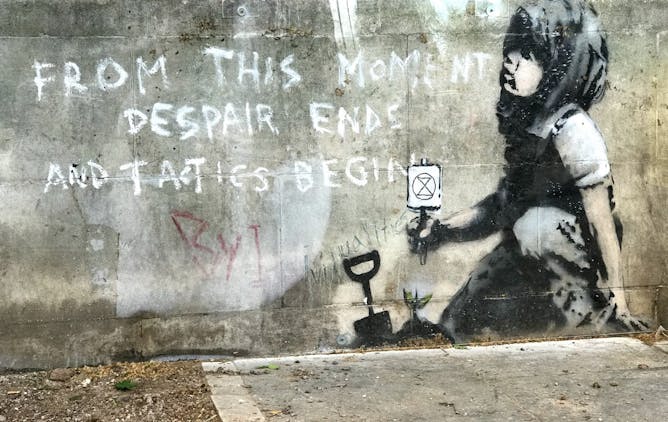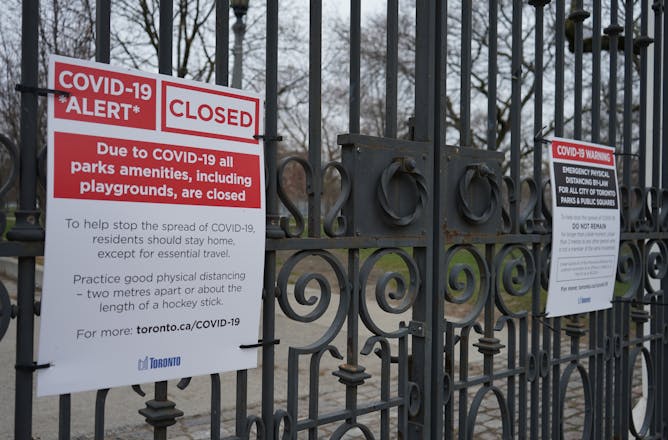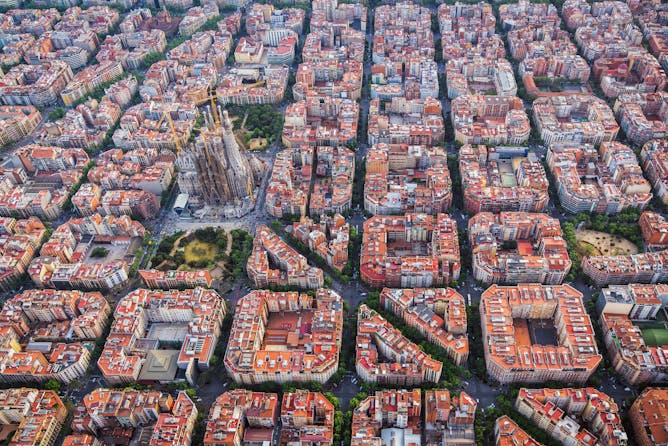|
Record-breaking temperatures, the highest number of named storms barrelling through the Atlantic, vast stretches of forest burned on multiple continents. In terms of climate disasters, last year was catastrophic.
Today in The Conversation Canada Matthew Hoffmann from the University of Toronto writes about the hope that shines through the torrents of bad news. There is, for example, still time to limit global warming to meet the target of the Paris Climate Agreement. In the midst of a pandemic, with climate-related disasters circling, it’s easy to adopt a tone of despair, but it’s important to reject that despair and embrace the hope that can be found in uncertainty.
Also today:
|

Mural attributed to Banksy that appeared by Marble Arch, in London, during the Extinction Rebellion protests in April 2019.
(Andrew Davidson/Wikimedia)
Matthew Hoffmann, University of Toronto
While climate change is certain, some uncertainty remains in its severity — and that's where the hope shines through.
|

Physical distancing sign on the entrance to Trinity Bellwoods Park in Toronto on April 24, 2020.
(Shutterstock)
Bruce Erickson, University of Manitoba
The provision of recreational activities and access to public space have always been underpinned by moral and class values. Planning the post-pandemic reopening should address these inequities.
|

U.S. President Donald Trump and Melania Trump board Air Force One at Palm Beach International Airport on Dec. 31, 2020, to return to Washington after visiting his Mar-a-Lago resort.
(AP Photo/Patrick Semansky)
Steven H. Appelbaum, Concordia University
Donald Trump's narcissism and destructive style of leadership may influence organizational leaders who were impressed by what he was able to get away with during his four years as president.
|

Human-animal bonds can have beneficial impacts on society.
(Shutterstock)
Catherine Amiot, Université du Québec à Montréal (UQAM); Brock Bastian, University of Melbourne
The ways in which humans connect with animals relate to how we interact with other humans. Understanding these relationships can help inform more inclusive societies.
|

Le consommateur passif a été remplacé par un consommateur acteur, qui adopte tour à tour le rôle de fournisseur, de bénévole, ou de partenaire.
Shutterstock
Myriam Ertz, Université du Québec à Chicoutimi (UQAC)
La pandémie a fait émerger des plates-formes comme Le Panier Bleu ou Ma Zone Québec, qui combinent le commerce en ligne et l’achat local. Ces initiatives ont-elles un avenir à long terme ?
|

Une partie du quartier de l'Eixample à Barcelone.
marchello74/Shutterstock
Anupam Nanda, University of Manchester
Rendre les villes plus vertes est une initiative essentielle, mais qui comporte des pièges potentiels.
|
Science + Technology
|
-
Sarah Hainsworth, Aston University; Michael Fitzpatrick, Coventry University
Technology can give superhero abilities to people in real life.
|
|
|
|
Politics
|
-
Donald Brand, College of the Holy Cross
The 1887 Electoral Count Act spells out the process for Congress to convene and review election results on Jan. 6, and it requires both the House and Senate to uphold any challenges to Biden's win.
|
|